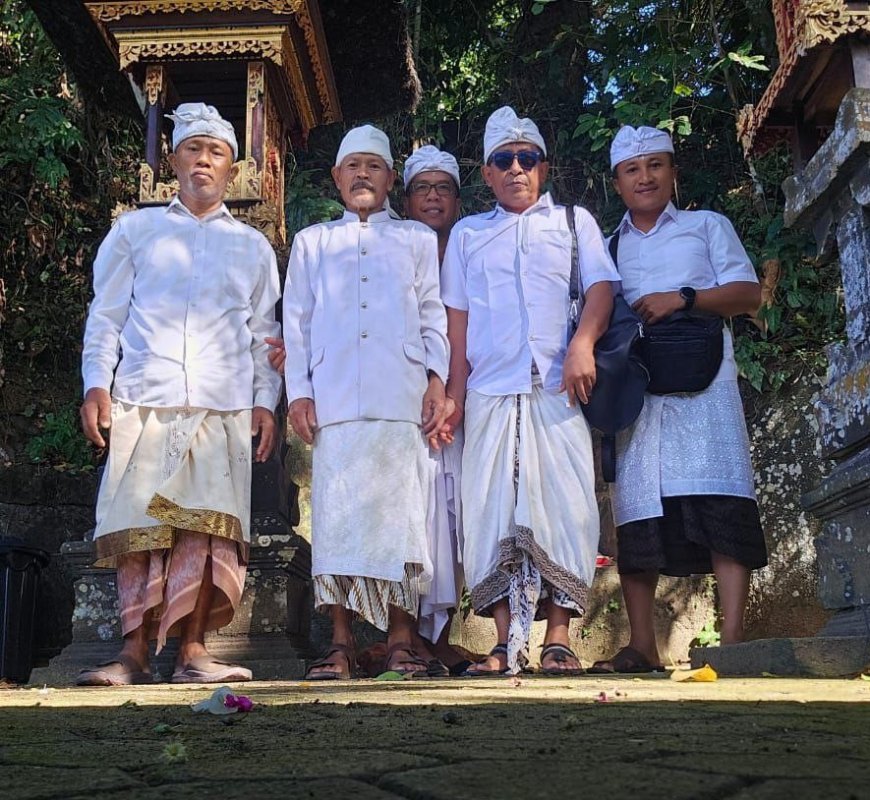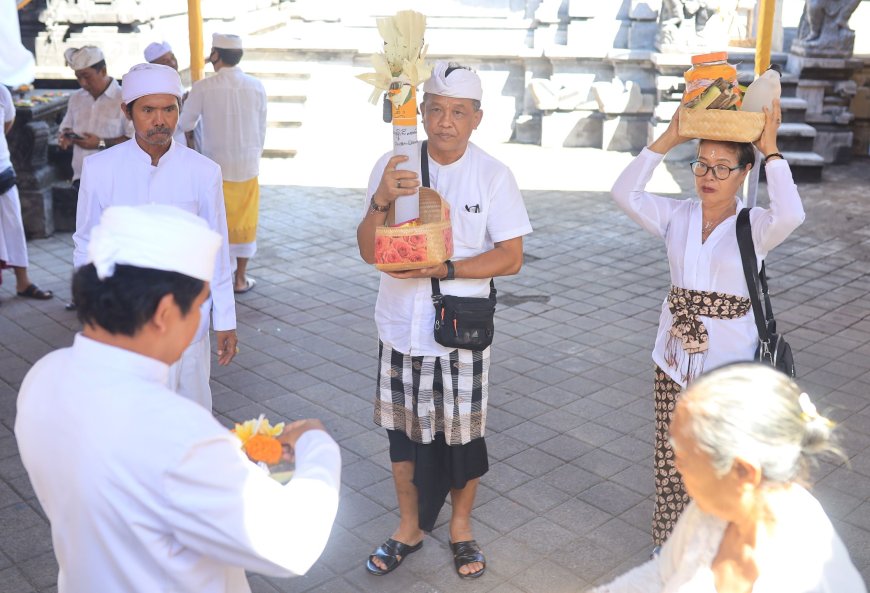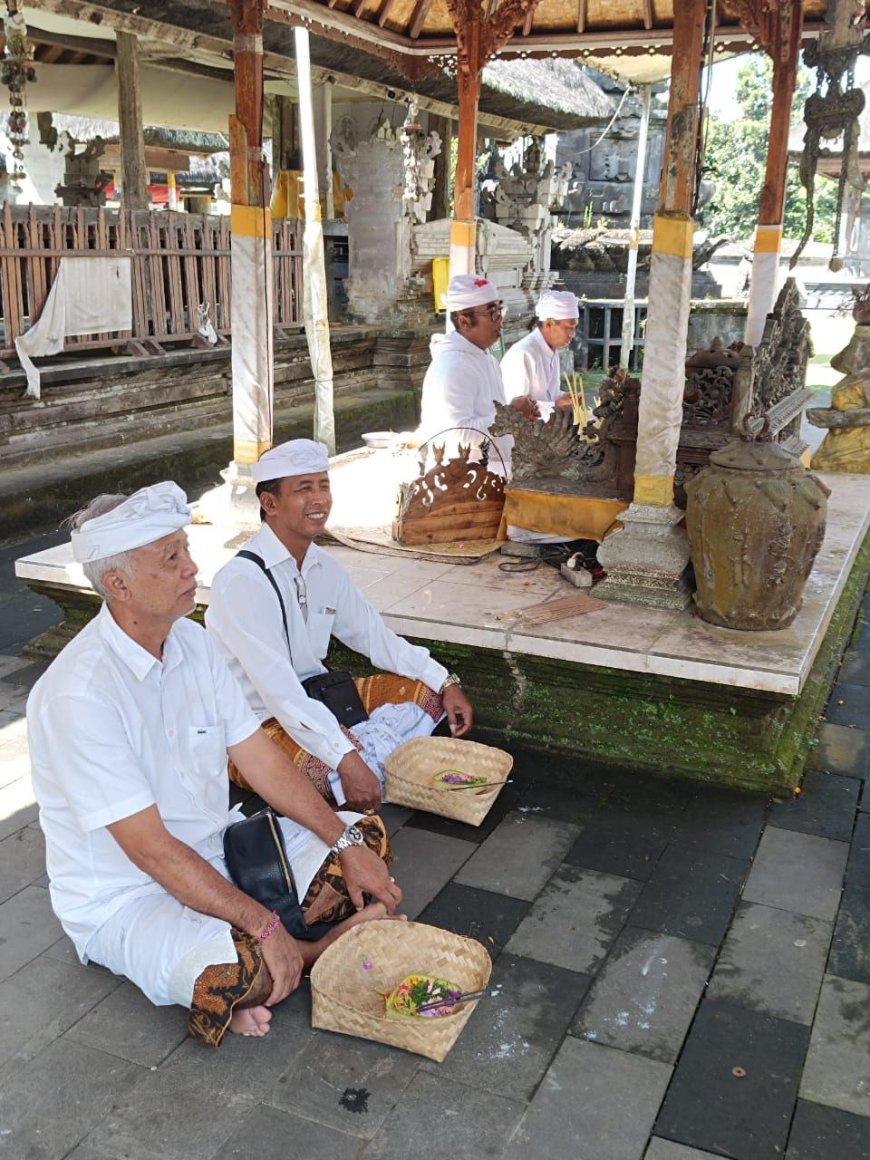Nunas Jejaton Pemiyut: The Vibrational Power of Earth’s Sacred Essence in Creating Satwika Offerings for the Grand Yadnya
Unlike Nunas Tirta Pemuket, where the request is for sacred water for spiritual purification, Nunas Jejaton Pemiyut involves requesting materials such as rice, padi, palawija (food crops other than rice), spices, and similar items in small quantities. These small quantities of the core element, which have spiritual power and purity, are then mixed with larger quantities of materials during the grand ceremony. The purpose of using this small quantity is to impart spiritual power, remove impurities, and spread purity throughout the larger quantities of ceremonial materials. As a result, these larger quantities gain the satwika quality—pure, harmonious, and benevolent spiritual attributes—making them ready for use in ritual and spiritual contexts.

In addition to Nunas Tirta Pemuket, the series of grand ceremonies including Ngenteg Linggih, Ngusabha Desa, and Mapahayu Nini at the Pura Desa and Puseh Desa Adat Mengwitani—culminating on October 5, 2024—also involves a sacred ritual that is simple yet rich in meaning: Nunas Jejaton Pemiyut. This ritual, which takes place on August 26, 2024, alongside Nunas Tirta Pemuket, includes a sacred journey or pilgrimage to several temples in Bali that have unique characteristics and special relevance to the Jejaton offerings for the grand ceremony.
Some of the temples visited during this ritual include Pura Jatiluwih in Desa Sarin Bhuawana, Tabanan; Pura Luhur Muncak Sari, Tabanan; Pura Sarwa Genep, Tabanan; Pura Pemuteran Jagat Sidakarya in Denpasar; and Pura Gunung Raung Taro in Desa Taro, Gianyar. Each temple visited has its own distinct characteristics and significance, providing a unique spiritual dimension to this series of ceremonies.
What exactly does "Nunas Jejaton Pemiyut" mean? Literally, the word Nunas means "to request". Jejaton comes from the root word 'jatu', which means "core" or "essence," and through a morphological process (partial reduplication) and the addition of the suffix -an, it becomes 'jejatuan', and then undergoes vocal encoding to become 'jejaton'. Meanwhile, Pemiyut comes from the root word "miut," meaning "to cut" or "to remove." With the prefix "pe-" indicating action or process, Pemiyut generally refers to the process of purification or cleansing aimed at removing negative influences or spiritual impurities.
Nunas Jejaton Pemiyut is a ritual practice in Balinese tradition that involves requesting and applying the spiritual power of earth's essence. In this context:
- Nunas means "to request".
- Jejaton comes from the root word 'jatu', meaning "core" or "essence," referring to a small quantity of the core element with spiritual power.
- Pemiyut comes from "miut," meaning "to cut" or "to remove," referring to the purification or cleansing process.

Prawartaka Nunas Jejaton Pemiyut at Pura Sarwa Genep, Tabanan Regency

Mendak Jejaton Pemiyut and Tirta Pemuput from Sida Karya Temples, Denpasar City

Nunas Empehan Lembu from Gunung Raung Taro Temples, Gianyar Regency
Unlike Nunas Tirta Pemuket, where the request is for sacred water for spiritual purification, Nunas Jejaton Pemiyut involves requesting materials such as rice, padi, palawija (food crops other than rice), spices, and similar items in small quantities. These small quantities of the core element, which have spiritual power and purity, are then mixed with larger quantities of materials during the grand ceremony. The purpose of using this small quantity is to impart spiritual power, remove impurities, and spread purity throughout the larger quantities of ceremonial materials. As a result, these larger quantities gain the satwika quality—pure, harmonious, and benevolent spiritual attributes—making them ready for use in ritual and spiritual contexts.
Nunas Jejaton Pemiyut teaches us valuable lessons on how ritual practices in Balinese tradition integrate the spiritual power of core elements into large quantities of ceremonial materials. By requesting small quantities of core elements and mixing them with larger quantities, this process ensures not only purification and removal of impurities but also the deep spreading of purity. This reflects the importance of applying spiritual principles in every aspect of ritual, connecting divine power with material elements to achieve desired religious and spiritual goals.






























































